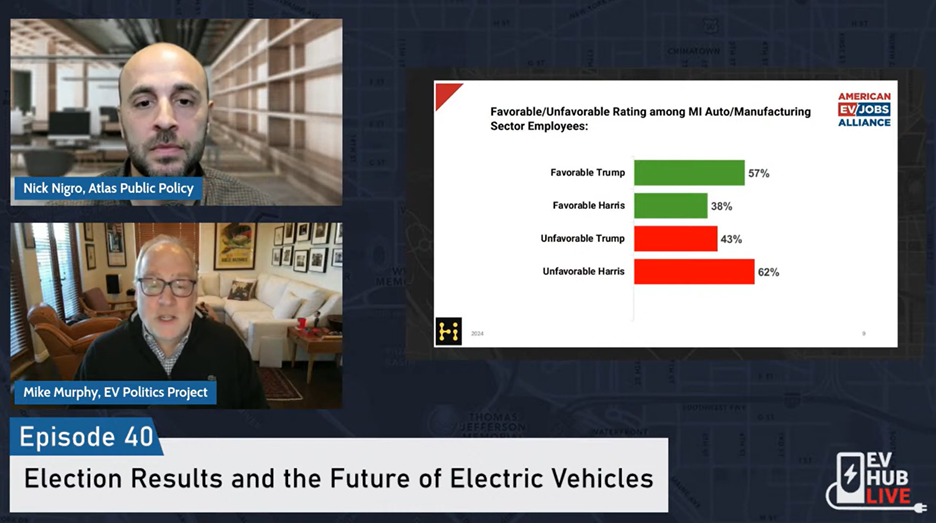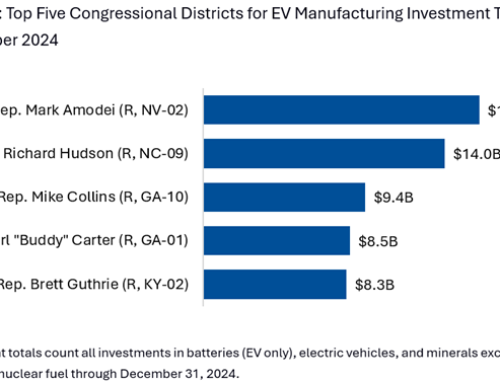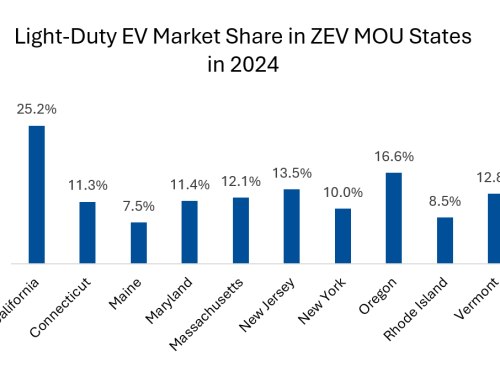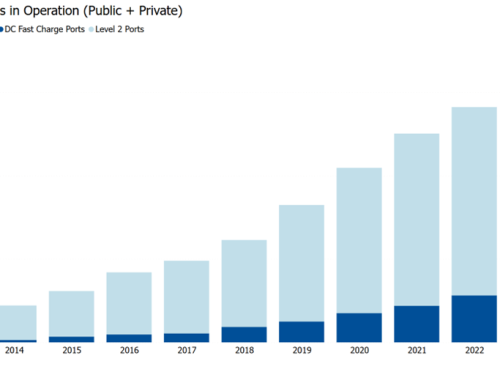
Shortly after the election, Atlas Public Policy’s founder, Nick Nigro, sat down with Mike Murphy, CEO of the EV Politics Project, to discuss what the results mean for electric vehicles (EVs). In this episode of EV Hub Live, Nick and Mike had a lively discussion about what the incoming Trump administration and Republican Congress could mean for the investments in EVs and in battery manufacturing made in the past few years and how messaging needs to change going forward. Below are a few key takeaways from Nick and Mike’s conversation.
How EVs might have influenced the outcome of the election
The EV Politics Project found that EV messaging ahead of the election may have had an influence on the outcome. They tracked over $30 million in television advertising in Michigan that mentioned EVs, of which 89 percent was negative. Senator-elect Elissa Slotkin, who won her race, did run a counter ad highlighting the jobs created by EV manufacturing, whereas Vice President Kamala Harris did not. Notably, Slotkin’s margin compared to Harris’s was higher in automaking counties than it was statewide, suggesting that her ad highlighting EV-related job creation might have held sway over voters.
Additionally, two weeks before the election, the EV Politics Projects surveyed Michigan voters and found that, by a margin of two to one, voters thought that government pushing the sales of EVs would be “a bad thing” for Michigan.
What a Republican trifecta in Washington means for EVs
Mike’s outlook is that Republican control of the White House and both chambers of Congress will be “mixed and not great, to potentially really bad.” Purchase subsidies and American-made stipulations will be complicated, longer fights but are likely to be revisited. However, of particular concern for Mike, is the lease exception which has been an effective tool for dealers and, given that most EV drivers lease rather than own, is “hugely important if we want to go to electrification.”
That said, some Republicans have advocated for “reform, not repeal” which will likely hold true for EVs as well. Manufacturing incentives maybe less at risk given the economic benefits they have brought, largely to Republican districts. Keeping these carrots in place will be critical, not only for Trump to deliver on his campaign promises about American manufacturing, but also for the political future of Republicans who represent these districts. Given the slim majority Republicans hold in the House, they will likely not want to take too big of a knife to the programs that have brought jobs and investment to their districts.
The Elon factor, automakers, and the EV market
Elon Musk has built a close relationship with Trump, which could influence the political fight over EVs. Musk has previously made statements opposing EV incentives and Mike believes that Musk will likely fight for Tesla’s interests but not those of the EV market at large. That could mean cutting incentives but maintaining EPA standards for tailpipe emissions, the combination of which will make it challenging for other automakers to compete. That will benefit Tesla in the short term but, in the long term, a depressed EV market will not.
Other automakers might take a similar short-term gain, long-term pain posture. They may face pressure to realign their priorities to maximize immediate profit gains and punt, pause, or fully stop long-term strategies to increasing foray into the EV market, despite recent gains in competitive products.
The bright spot for the EV market could come in used EV sales. With so many cars soon to come off lease, the already-cheaper used EV inventory could swell, and increased sales could drive EV market share.
Public opinion and advice for the EV community going forward
As Mike says, “we have a great story to tell but it doesn’t mean anything if we don’t tell it.” The Michigan election analysis, as well as other polling the EV Politics Project has done, indicates that the public can be swayed by messaging around manufacturing jobs. Mike recommends the EV community capitalize on this and make the new manufacturing plants “famous.” At that point, it becomes challenging for Republicans to fight against or undermine those projects, especially going into midterms. Essentially, the EV community needs to “pick a jobs fight.”
In addition to reframing the jobs away from “green” or“ clean,” Mike recommends that the environmental benefits of EVs not hold the spotlight in advertisements. Instead, polling shows that when focusing on the speed of the vehicle, the savings on gas, and the driver experience, Republicans and Democrats support EVs equally.


